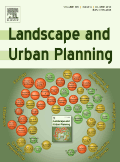
LANDSCAPE AND URBAN PLANNING
Scope & Guideline
Navigating the complexities of urbanization and conservation.
Introduction
Aims and Scopes
- Urban Ecosystem Services:
Research exploring the benefits provided by urban ecosystems, including green spaces, parks, and waterways, and their impact on urban living conditions. - Climate Adaptation and Resilience:
Studies aimed at understanding how urban landscapes can be designed or modified to adapt to climate change, including the integration of nature-based solutions. - Human Wellbeing and Environmental Health:
Investigations into the relationships between urban green spaces, mental health, physical activity, and overall wellbeing, and how these can be optimized through urban planning. - Biodiversity in Urban Settings:
Research on the preservation and enhancement of biodiversity within urban landscapes, including the effects of urbanization on wildlife and plant communities. - Social Equity in Urban Planning:
Exploration of social justice issues related to access to green spaces, the distribution of urban resources, and the impacts of gentrification on community dynamics. - Technological Innovations in Urban Planning:
Application of advanced technologies such as GIS, remote sensing, and machine learning to analyze urban landscapes and inform planning decisions.
Trending and Emerging
- Nature-Based Solutions (NbS):
An increasing emphasis on NbS for addressing urban challenges such as flooding, heat mitigation, and biodiversity loss. This approach promotes the use of natural processes to enhance city resilience. - Public Health and Urban Green Spaces:
Growing research interest in how access to green spaces influences public health outcomes, particularly in the context of mental health and physical activity. - Equity and Inclusion in Urban Planning:
A significant rise in studies focusing on environmental justice, exploring how urban planning can address disparities in access to green spaces and promote inclusivity. - Technological Integration in Urban Analysis:
Emerging trends in utilizing advanced technologies, including big data analytics and machine learning, to assess urban environments and inform planning strategies. - Community Engagement and Participatory Planning:
An increasing focus on involving local communities in the planning process, recognizing the importance of local knowledge and preferences in shaping urban landscapes.
Declining or Waning
- Traditional Urban Planning Practices:
There seems to be a waning focus on conventional urban planning methodologies that do not integrate ecological or social considerations, as newer, more integrative approaches gain traction. - Purely Aesthetic Landscape Studies:
Research that solely emphasizes aesthetic values without considering ecological or social functions of landscapes is becoming less prominent, as a more holistic understanding of landscapes is favored. - Single-Dimensional Environmental Assessments:
There is a noticeable decrease in studies that assess environmental impacts without considering social, economic, or health dimensions, reflecting a broader trend towards interdisciplinary research.
Similar Journals

JOURNAL OF PLANNING EDUCATION AND RESEARCH
Shaping Tomorrow's Cities Through Rigorous ScholarshipJOURNAL OF PLANNING EDUCATION AND RESEARCH, published by SAGE Publications Inc, stands at the forefront of academic discourse in the fields of planning, geography, and urban studies. Established in 1981 and continuing through to 2024, this esteemed journal features cutting-edge research and critical analyses that address the pressing challenges of urbanization and community development. As a recognized leader with prestigious Q1 rankings in Development, Geography, Planning and Development, and Urban Studies categories, it ranks 22nd out of 279 in Urban Studies, underscoring its influence with a remarkable 92nd percentile ranking in the Scopus database. Although the journal does not currently offer open access options, it provides a vital platform for researchers, professionals, and students dedicated to understanding and shaping the complex dynamics of urban environments. With a commitment to advancing knowledge and practice, the journal supports interdisciplinary scholarship and encourages the publication of innovative ideas that foster sustainable urban solutions.

ACE-Architecture City and Environment
Innovating for a Greener, More Inclusive Urban LandscapeACE-Architecture City and Environment, published by Universitat Politècnica de Catalunya in Spain, serves as an essential repository for innovative research and insights that intersect the fields of architecture, urban studies, and environmental planning. Since its establishment as an Open Access journal in 2006, it has facilitated widespread accessibility to scholarly work, fostering a collaborative and inclusive academic community. The journal has consistently maintained a prominent standing within its field, reflected in its 2023 Quartile rankings—, Q3 in Geography, Planning and Development, and Q2 in Urban Studies. With a publication horizon extending from 2011 to 2024 and an impressive Scopus ranking among peers, it offers a comprehensive platform for researchers to disseminate their findings and engage with contemporary challenges in urban environments. ACE is pivotal for professionals and students alike, striving to shape the future of sustainable architecture and urban planning through rigorous scholarship.
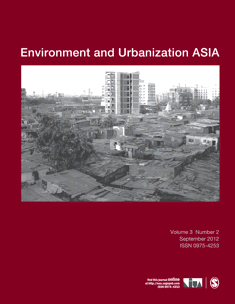
Environment and Urbanization ASIA
Advancing Knowledge for Sustainable Urban FuturesEnvironment and Urbanization ASIA is a leading academic journal published by SAGE Publications Ltd, focusing on the interplay between urbanization and environmental change across Asia. With an ISSN of 0975-4253 and E-ISSN 0976-3546, this peer-reviewed journal has established itself as an essential resource for scholars and practitioners alike, contributing significantly to the field of urban studies. Ranked in the Q1 category for Urban Studies in 2023 and positioned at 93rd out of 279 in Scopus, it reflects a robust percentile ranking of 66%, underscoring its impact and relevance. Published on a biannual basis, Environment and Urbanization ASIA aims to foster interdisciplinary dialogue and disseminate cutting-edge research that explores the complex dynamics of urbanization, sustainability, and environmental governance. Though it currently does not offer open-access options, its wealth of scholarly articles offers invaluable insights, making it a cornerstone for anyone engaged in addressing the challenges facing rapidly urbanizing regions in Asia. Join the community of researchers, professionals, and students dedicated to exploring innovative solutions in this critical area of study.
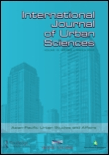
INTERNATIONAL JOURNAL OF URBAN SCIENCES
Connecting Scholars to Urban ChallengesThe INTERNATIONAL JOURNAL OF URBAN SCIENCES, published by ROUTLEDGE JOURNALS, TAYLOR & FRANCIS LTD in the United Kingdom, stands as a leading academic forum for innovative research in the fields of urban studies and geography. With its ISSN 1226-5934 and E-ISSN 2161-6779, this prestigious journal has been continuously converging insightful findings since 1998, providing a valuable platform for scholars and professionals to disseminate their work through both rigorous peer review and an influential global reach. Recognized within the top quartiles (Q1) for both Geography, Planning and Development and Urban Studies according to the 2023 metrics, it holds impressive Scopus ranks, being positioned at #36/279 (87th percentile) in Urban Studies. By encouraging interdisciplinary dialogue and addressing contemporary urban challenges, the journal aspires to inform policy, practice, and education within rapidly changing urban environments. Researchers, professionals, and students alike will find a wealth of relevant knowledge and cutting-edge research that drives the discourse on sustainable urban development and planning.
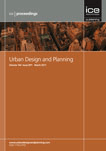
Proceedings of the Institution of Civil Engineers-Urban Design and Planning
Exploring Interdisciplinary Approaches to Urban DesignProceedings of the Institution of Civil Engineers-Urban Design and Planning is a leading scholarly journal published by EMERALD GROUP PUBLISHING LTD, dedicated to advancing knowledge and innovation in the fields of urban design and planning. With an ISSN of 1755-0793 and E-ISSN 1755-0807, this journal serves as a vital platform for researchers, professionals, and students to disseminate impactful studies and findings. It boasts impressive rankings, including Q1 in Architecture and notable positions in Civil and Structural Engineering and Urban Studies, underscoring its significance in the academic community. The journal's scope encompasses a diverse array of topics relevant to urban environments, encouraging interdisciplinary dialogue and exploration. Although it operates under traditional access, its contributions are invaluable, reflecting the latest developments and challenges within urban planning practices. Published regularly since 2009, the Proceedings of the Institution of Civil Engineers-Urban Design and Planning is vital for those seeking to enhance their understanding of sustainable urban development and design methodologies, making it a critical resource in its fields of study.
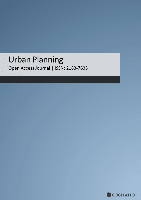
Urban Planning
Elevating the discourse on spatial planning and development.Urban Planning is a leading academic journal published by COGITATIO PRESS, devoted to advancing the field of urban studies through rigorous research and innovative practice. Established as an Open Access journal in 2016, it offers a platform for scholars and practitioners alike to disseminate knowledge on urban development, spatial planning, and community engagement. With an impressive ranking in the Q1 category for Urban Studies and a notable Scopus rank of #71 out of 279, it reflects the journal's commitment to excellence and influence within its discipline. Based in Lisbon, Portugal, and dedicated to a global audience, Urban Planning encourages interdisciplinary collaboration and seeks to address the pressing challenges faced by urban areas, making it an essential resource for researchers, professionals, and students passionate about shaping sustainable cities. The journal, which contributes to the academic discourse through a robust review process and encourages contributions that engage diverse voices, is set to converge its insights from 2016 to 2025, solidifying its role as a pivotal resource in the urban studies field.
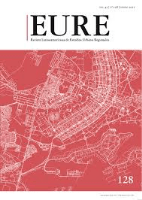
EURE-REVISTA LATINOAMERICANA DE ESTUDIOS URBANO REGIONALES
Innovating Urban Studies for Sustainable Regional DevelopmentEURE-REVISTA LATINOAMERICANA DE ESTUDIOS URBANO REGIONALES, published by the Pontificia Universidad Católica de Chile, is a pivotal journal in the field of Urban Studies, focusing on the complexities and dynamics of urban and regional environments across Latin America. Since its inception in 1979 and transitioning to an open-access format in 1997, this journal aims to provide a platform for scholars, policymakers, and practitioners to share innovative research and insights on urban development, policy, and sustainability. With an impact factor robust enough to rank it in the Q2 category within Urban Studies and a Scopus rank of #124 out of 279, EURE stands out as a significant contributor to understanding urban phenomena in the region. Researchers and students alike will find in this journal a wealth of empirical studies, theoretical discussions, and case analyses, enriching the discourse on urban challenges and opportunities in contemporary Latin America.
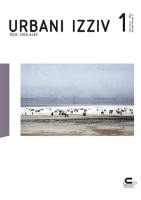
Urbani Izziv-Urban Challenge
Shaping the Future of Urban DevelopmentUrbani Izziv - Urban Challenge, a prominent journal in the field of urban studies and planning, is published by the Urban Planning Institute of the Republic of Slovenia. Established in 1993, this Open Access journal aims to foster the dissemination of cutting-edge research and innovative ideas in architecture, cultural studies, and urban development. With an impressive impact, it holds a Q2 ranking in both Architecture and Cultural Studies, while maintaining a solid presence in Geography, Planning and Development, and Urban Studies categories. As of 2023, it ranks within the top 25% of journals in the Cultural Studies discipline, highlighting its pivotal role in shaping urban discourse. Researchers and practitioners alike will find the journal an invaluable resource for exploring the intertwined challenges of urbanization, cultural evolution, and sustainable development. With an expansive convergence from 1994 to 2024, it continues to attract influential contributions that illuminate the dynamics of urban life in Slovenia and beyond.
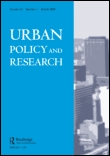
Urban Policy and Research
Advancing Urban Knowledge for a Sustainable FutureUrban Policy and Research is a leading academic journal dedicated to advancing the fields of urban studies and geography, planning, and development. Published by Routledge Journals, Taylor & Francis Ltd, the journal has been a vital resource since its inception in 1982 and continues to shape scholarly discourse up to 2024. With an impressive 2023 Scopus ranking that places it in the 70th percentile for Urban Studies and 63rd percentile for Geography, Planning and Development, it reflects a strong commitment to rigorous research and innovative insights. Although not an open-access journal, it provides valuable access options to support the dissemination of knowledge among researchers, professionals, and students. By engaging with a diverse range of topics, Urban Policy and Research serves as an essential platform for exploring contemporary urban challenges and fostering informed policymaking in an evolving global landscape.
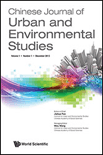
Chinese Journal of Urban and Environmental Studies
Pioneering Research for Resilient Cities and EcosystemsChinese Journal of Urban and Environmental Studies, published by World Scientific Publishing Co Pte Ltd, stands at the intersection of urban studies and environmental research, providing a critical platform for the dissemination of knowledge and innovative ideas in these increasingly vital fields. With an ISSN of 2345-7481 and E-ISSN 2345-752X, this open-access journal has been recognized for its significant contributions, achieving impressive quartile rankings, including Q2 in Urban Studies and Q2 in Geography, Planning and Development for 2023. As it converges from 2019 to 2024, the journal aims to foster interdisciplinary collaboration and to stimulate dialogue among researchers, professionals, and policymakers. With its focus on relevant socio-economic and environmental issues, Chinese Journal of Urban and Environmental Studies serves as an essential resource for anyone looking to gain insight into the complexities of urban environments and their ecological impacts, making it an indispensable addition to the libraries of those committed to sustainable development and urban planning.